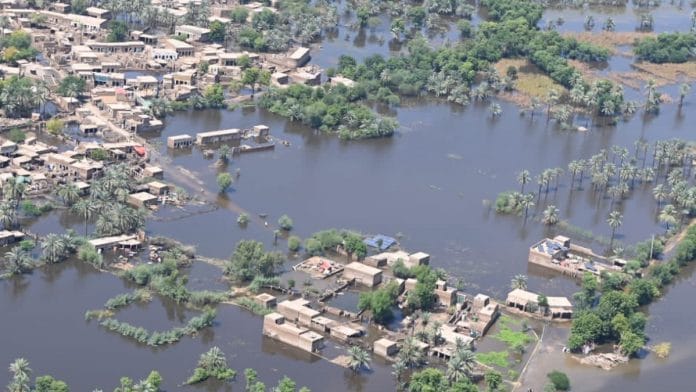New Delhi: A woman’s menstruation cycle does not stop just because a third of a country is under water — Lahore-based college student Bushra Mahnoor’s powerful message has caught the attention of the world, but it has also sparked a debate on social media: whether sanitary pads are a luxury or a necessity.
Pakistan’s devastating floods, which have affected an estimated 33 million people, have also exposed how vulnerable women are. At least 8 million women are reported to be of reproductive age in Pakistan and sanitary napkins are increasingly featuring on the list of essential supplies sent out by districts.
Commenting on the situation, a social worker told Dailytimes, “Please send anything for menstruating girls. They have nothing and they feel extremely humiliated walking or sitting in shelters with clothes covered in blood, food isn’t what they look for right now, please send as many sanitary products as possible.”
Mahwari Justice
On Twitter, under the banner, ‘Period Justice for Flood Victims’, Mahnoor a student at the University of Punjab is forcing Pakistan and the rest of the world to talk about periods in times of a national crisis. Along with her friend, Anum Khalida, she launched a campaign, Mahwari Justice — ‘Mahwari’ means periods in Urdu—to distribute menstrual hygiene products to flood-affected women.
Starting in June, the two young women have mobilised their friends and volunteers to raise funds to purchase, pack and dispatch emergency sanitary kits with pads, underwear and soaps. Each kit costs Rs 200. They’ve also appealed for aid on Twitter.
By starting this initiative , the team has already sent thousands of kits to the worst-hit areas. In the city of Multan, the transgender community has taken lead to propel local effort in the distribution of kits.
But Mahnoor and the women rallying behind her battle cry are already facing backlash.
Also read: Pakistan’s floods threaten to destroy Mohenjo-daro as rains batter Indus civilisation site
Fighting the taboo
Not many men were comfortable with Mahnoor talking about menstruation so openly. She told Dawn that she met with resistance when she first spoke to men about the kind of help Mahwari Justice wanted to provide. “Menstruation is a big taboo in Pakistan and it was not easy,” she told the Pakistan Daily.
It has also invited inconsiderate responses from men on social media.
From highlighting the greater necessity of food in a time like this, to taking a jibe at the initiative by comparing it with men’s ‘shaving machines’, Twitter wars between those who support the initiative and those who do not, have begun.
As one woman thanked ‘Mahwari Justice’ for providing this necessity to women, a man called it a luxury. This enraged other women on social media.
I really want to appreciate you for thinking of this necessity. Most people don't think as such.
— Sabahat Urooj (@suavox1) August 27, 2022
Not necessity this is luxury
— Muhammad Uzair??❤ (@Uzairpanwar) August 27, 2022
So what do you expect women to do? Bleed their clothes out? Please elaborate how is this a luxury? And if this is a luxury I would suggest people to stop using diapers, tissues, napkins, soaps, shampoos and anything that falls under the same category because that is a luxury too!
— Meeyum (@meeyyumm) August 28, 2022
Mahnoor also talks about how most people consider period products a ‘luxury’ rather than a basic necessity. According to her, people on social media have trivialised the matter and even accused the campaign of ‘working on an agenda.’
Also read: Led by Jihad commander, Lashkar defies FATF threat to carry out flood-relief work in Pakistan
Disaster (mis)management
In the Sindh province, particularly, more than 1,000 health facilities are either partially or completely damaged. In Balochistan, 198 facilities are in a disheveled state. Further compromising girls’ and women’s lack of access, roads and bridges in Pakistan have also been gravely damaged.
Many pregnant women have also been exposed to the risks of these communicable diseases. The UN sexual and reproductive health agency (UNFPA) even warned that about 650,000 pregnant women in flood-affected areas, including 73,000 expected to deliver in the next month, are in dire need of maternal health services.
Half-a-million flood-displaced people continue to live in temporary shelters. There is growing concern around women’s health and safety as they stay in dilapidated makeshift camps without showers, and share toilets with strangers.
While Mahnoor’s own mother criticises her daughter’s efforts and calls her ‘shameless’, the fight goes on as ‘Mahwari Justice’ persists in their efforts to gain domestic and international donations for the flood affected women.
A community is coming together online, to aid Pakistani women. Another campaign, ‘Voice of Women Pakistan,’ endeavours to provide undergarments and pads for women. ‘Hunar Ghar’ in Karachi has also started making homemade sanitary pads for the victims.
Home made sanitary pads being made by Hunar Ghar in Karachi
Please reach out if you want to distribute in flood relief affectees
cc @MariaTaqdees #FloodsInPakistan
Pl retweet pic.twitter.com/xDxfnYTuyh
— Sophia Ahmed (@sophiaahmed) September 2, 2022
(Edited by Anurag Chaubey)






